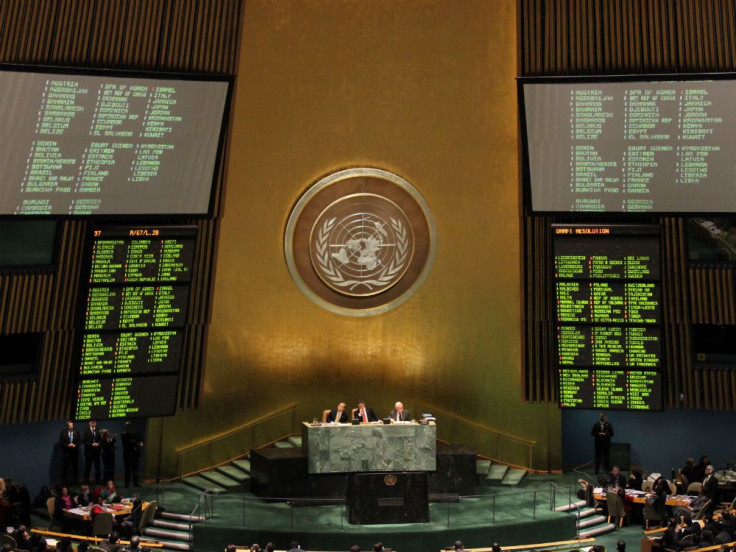Full Text: President of the UN General Assembly's Remarks On Day Of Solidarity With The Palestinians

Mr. Chairman, President Abbas, Mr. Secretary-General, Mr. President of the Security Council, Excellencies, Ladies and Gentlemen,
It is a great privilege to participate in the observance of the International Day of Solidarity with the Palestinian People on this historic date.
This is an emotional occasion for me personally, because of my ancestors’ legacy. Yugoslavia is with us no more, but we are with you and proudly so. Mr. President, it is truly an honor to have you here with us.
I would like to thank this Committee for its dedicated work, and for convening this meeting, as it has done every year since 1978.
The quest to fulfill the inalienable rights of the Palestinian people is the item that has remained on the agenda of the General Assembly longer than any other one.
Close to 70 years after the adoption of resolution 181 by the plenary in 1947, a two State solution had not yet come to pass. Millions of Palestinians continue to live in poverty in the myriad camps scattered throughout the Middle East.
My deeply held view is that this is one of the world’s most fundamental wrongs.
It stands in the face to the central tenet of the UN Charter: to create a workable international system that not only helps to prevent conflicts, but asserts the preeminence of justice pledging not only equal rights to all nations, but ensuring their equal dignity as well.
At the start of my term in office, I called on the Member States to work together so that this session of the General Assembly may go down in history as an Assembly of Peace an Assembly of Progress and Hope for all mankind.
On this occasion, when the United Nations solemnly observes the International Day of Solidarity with the Palestinian People, I renew this call.
I know how deep the feelings of injustice may rightfully be but focusing exclusively on this will not close the book on an era of enmity in the Middle East.
At this delicate moment, we truly need to avoid bitter, self-perpetuating divisions, and their accompanying calls for more and more vengeance.
The horrors of the past inevitably shape who we are, but unless we are ready to tame and eventually overcome them, the future is not likely to be any different.
I am convinced that the courage to reach out to one other can be found, so the wounds can heal and the region can finally come to prosper in peace and security.
Ladies and Gentlemen,
Over the past few weeks, we have witnessed a new wave of violence in Gaza. I commend the fruitful efforts to help broker a truce by the His Excellency Mr. Mohammad Morsy, President of the Arab Republic of Egypt; His Excellency Mr. Ban Ki-moon, the Secretary-General of the United Nations; the Honorable Mrs. Hillary Clinton, Secretary of State of the United States; and others.
The recent upsurge in violence reminds us of the urgency of the task that now must follow: to resume peaceful negotiations leading to a comprehensive settlement to the question of Palestinian statehood.
The suffering in the Holy Land must come to an end.
Ladies and Gentlemen,
I am grateful to this Committee for their continuing role in focusing the attention of the General Assembly and the rest of the United Nations system on the plight of the Palestinian people.
Its consistent promotion of their inalienable rights and its support for the Middle East peace process remains critical and so are its efforts to mobilize international assistance to those who need it most.
In a few hours’ time, the General Assembly will consider a resolution to renew the mandates of this Committee and the respective Secretariat Units.
It will also take up for the first time a resolution to accord to Palestine the status of a Non-member Observer State in the United Nations.
Whatever the result, it will be crucial for the Palestinians and Israelis to transform its effects into an opportunity to return to the negotiating table actively supported by all who can help bring them closer together.
The goal must be to repair the breech, and to achieve at long last what was envisioned in 1947: a just and comprehensive settlement a two-State solution.
I come to the end of my remarks by recalling the eloquence of a great classical poet, and his timeless entreaty to “bring to pass that the savage works of war may be stilled to rest throughout all seas and lands” so that one day soon, the State of Israel can live in security with all its neighbors, and the State of Palestine can take its rightful place in the world family of nations.
Thank you for your attention.
© Copyright IBTimes 2025. All rights reserved.






















